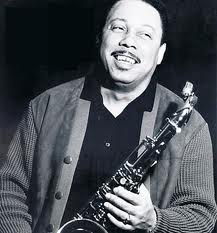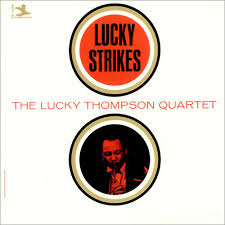Mumba Neua – Eli "Lucky" Thompson
This rhythmic Latin song has several different bass figures, which are shown in our lead sheets. Like many later Lucky Thompson songs, the solos on the recording are over a blues-based form—this time with a bridge.
- Recording: Lucky Thompson - Lucky Strikes
- Recorded on: September 15, 1964
- Label: Prestige (PR 7365)
- Concert Key: B-flat
- Vocal Range: , to
- Style: Latin (uptempo)
- Soprano Sax - Lucky Thompson
- Piano - Hank Jones
- Bass - Richard Davis
- Drums - Connie Kay
- Description
- Historical Notes
- Solos
- Piano Corner
- Bass Corner
- Drum Corner
- Guitar Corner
- Inside & Beyond
- Minus You
On the recording, there are several different bass figures in the Latin parts of the song. These are shown in the lead sheets. There is a 16-measure intro which begins with solo bass, adding drums and then piano. There's also twelve measures after the solos to set up the out head, with the rhythm section entering in a different order: drums, bass, and piano. The coda fades out on a two-measure vamp. All of these have different bass lines, in 1-, 2-, and 4-measure patterns. In addition the out head bass line is different from the in head; this is not shown in the lead sheet but it's essentially the same line that sets up the out head, adapted to alternating B♭ and A♭ chords.
For another similar Latin song by Lucky Thompson, check out Open Haus.
Richard Davis and Connie Kay first recorded together in 1962 on John Lewis' album "Essence", which features arrangements by Gary McFarland. They appear together on several other recordings in the '60s, including albums by Sonny Stitt, Milt Jackson, and Chet Baker; the latter's 1965 "Baker's Holiday" has the same rhythm section as "Lucky Strikes."
Another recording of Mumba Neua is on tenor saxophonist Michael Blake's 2006 tribute album to Lucky Thompson, "The World Awakes."
Related Songs
Email Send Mumba Neua to a friend

Eli "Lucky" Thompson
June 16, 1923 – July 30, 2005
Saxophonist Lucky Thompson is one of the great treasures of jazz. He was born in Columbia, South Carolina, but was raised in Detroit, Michigan. He played in local groups with Hank Jones, Sonny Stitt and others. In August, 1943, when he was 19, he left Detroit with Lionel Hampton's Orchestra, eventually arriving in New York City. Still a teenager, his first recording date was with Hot Lips Page on March 18, 1944. Later in 1944 he started recording with both Lucky Millinder and Count Basie. Read more...



